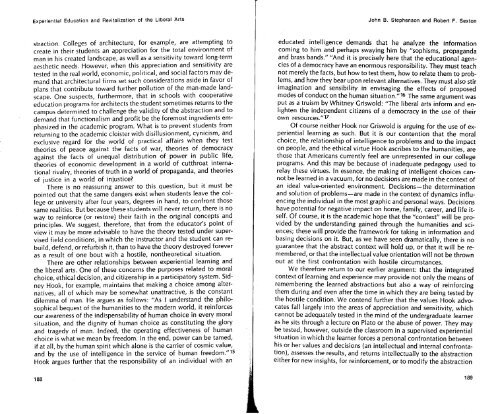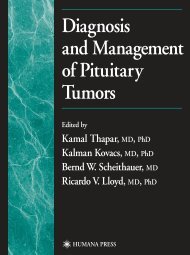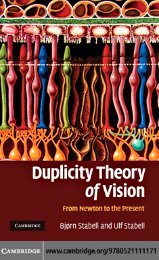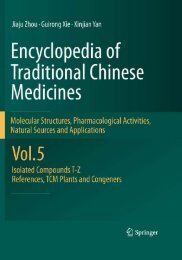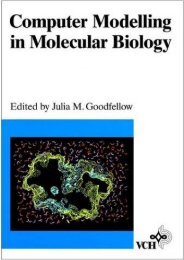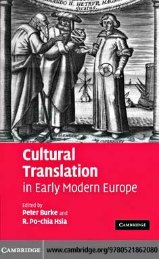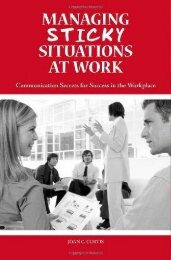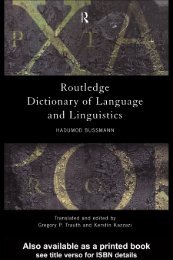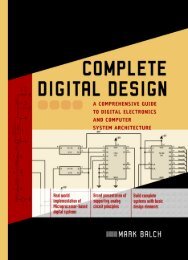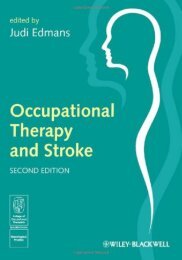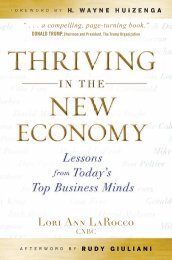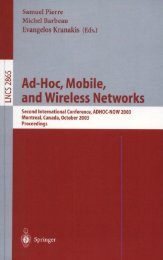Experiential Education and Revitalization <strong>of</strong> <strong>the</strong> Liberal ArtsJohn 6. Stephenson and Robert F. Sextonstanding <strong>the</strong> book could have provided was simply unavailable to allbut a few.But a breakthrough occurred when <strong>the</strong> writer developed seminars<strong>for</strong> full-time undergraduate interns in state-government settings. All<strong>the</strong> interns were located in situations where <strong>the</strong>y did real work <strong>for</strong> administrators<strong>of</strong> government agencies that related directly to <strong>the</strong> governor.<strong>The</strong> interns were aware, in a routine fashion, <strong>of</strong> <strong>the</strong> implications <strong>of</strong>practical gubernatorial power through <strong>the</strong>ir internship assignment, not<strong>the</strong>ir seminar. When <strong>the</strong> seminar reached <strong>the</strong> point <strong>of</strong> reflecting on <strong>the</strong>role <strong>of</strong> <strong>the</strong> contemporary governor, Huey Long was assigned. <strong>The</strong> booktook on new relevance and meaning <strong>for</strong> <strong>the</strong> students. <strong>The</strong>y couldidentify immediately with both Huey Long and his administrative environment."My agency would have reacted differently in thatsituation!" "<strong>The</strong> Governor pulled that maneuver on our department"were <strong>the</strong>ir reactions, indications that each student had a peg on whichto hang <strong>the</strong> in<strong>for</strong>mation. Moreover, <strong>the</strong> wealth <strong>of</strong> detail and analysis in<strong>the</strong> book, <strong>for</strong>merly a hindrance, now became an advantage; a thoroughanalysis <strong>of</strong> <strong>the</strong> milieu <strong>of</strong> one governor and one state political andadministrative structure, in <strong>the</strong> context <strong>of</strong> practical experience,brought understanding.<strong>The</strong> interns, <strong>the</strong>re<strong>for</strong>e, each had a personal experience with historicalunderstanding; <strong>the</strong>y placed <strong>the</strong>mselves and <strong>the</strong>ir agencies in<strong>the</strong> context <strong>of</strong> historical experience. And this was not, we should note,a matter <strong>of</strong> <strong>the</strong>ir relating <strong>the</strong>ory to reality. <strong>The</strong>y realized that this book,this "history," was in fact reality; historical consciousness dawned upon<strong>the</strong>m when Huey Long became as real as <strong>the</strong>ir current governor; <strong>the</strong>only difference was that <strong>the</strong>y read about one and observed <strong>the</strong> o<strong>the</strong>rpersonally.This anecdotal example draws us toward a larger question. Accordingto Ralph Tyler, a dean <strong>of</strong> American educational <strong>the</strong>orists, <strong>the</strong>belief that <strong>the</strong> mental process <strong>of</strong> abstraction comes be<strong>for</strong>e applicationis a middle-class belief related to social-class or employment differences.From this it followed that all persons, despite intellectual differences,were to be taught abstractions in <strong>the</strong> mode <strong>of</strong> training potentialpr<strong>of</strong>essionals. He argues that <strong>the</strong> notion is faulty, especially whenapplied to persons whose socioeconomic background is not middleclass but oriented toward pragmatic vocationalism. (Our experiencesuggests that <strong>the</strong> middle class have difficulties as well.) This suggeststhat we will not reach <strong>the</strong> new college student with our standardapproach, if indeed we are now reaching <strong>the</strong> old. Abstract curriculaare meaningless to many <strong>of</strong> today's students unless we provide <strong>the</strong>mwith some reason, some motivating factor to appreciate and use <strong>the</strong>abstraction. This motivation can be a field experience.But experience can be chaotic and meaningless unless <strong>the</strong> mindputs it into meaningful order. Reading Huey Long caused <strong>the</strong> studentto reflect on his experience and added <strong>the</strong> "order" <strong>of</strong> historical context.<strong>The</strong> college learning experience should simultaneously provide <strong>the</strong>means <strong>of</strong> generalizing upon one experience to come up with a myriad<strong>of</strong> experiences and a conceptual framework <strong>for</strong> those generalizations.Ano<strong>the</strong>r way <strong>of</strong> stating this is that <strong>the</strong> idea, <strong>the</strong> abstraction provides<strong>the</strong> individual with a reason to explore an experience, and when <strong>the</strong>idea and experience are thus observed <strong>the</strong>y both have meaning. Havingmeaning, <strong>the</strong>y will be remembered, used again and again, interactwith o<strong>the</strong>r ideas and experiences that have been generalized, andfinally enter <strong>the</strong> total being <strong>of</strong> <strong>the</strong> individual.We have argued that an experience becomes more meaningfulwhen combined with abstraction. In experiential learning situations,<strong>the</strong> reverse can just as easily be <strong>the</strong> case. <strong>The</strong> abstraction (<strong>the</strong> <strong>the</strong>ory,<strong>the</strong> generality) can be tested in a non<strong>the</strong>oretical environment, its validitycan be assessed in a concrete instance, its extension to this particularityexamined, and <strong>the</strong> practical applications determined. Onewould hope that <strong>the</strong> <strong>the</strong>ory, when merged with experience, will also beremembered better and used in <strong>the</strong> future.It is one thing, <strong>for</strong> example, to read in Max Weber <strong>of</strong> <strong>the</strong> distinctionbetween charismatic and rational-legal authority and quiteano<strong>the</strong>r to see, as an intern, <strong>the</strong> exercise <strong>of</strong> leadership in <strong>the</strong> ruleboundprocess <strong>of</strong> lawmaking in a legislature. In fact, it is one thing toread about <strong>the</strong> application <strong>of</strong> Weber's ideal types to reality and quiteano<strong>the</strong>r to attempt that application oneself. While Kant's observationthat nothing is more practical than a good <strong>the</strong>ory cannot be disputed,it can also be said that nothing rein<strong>for</strong>ces a good <strong>the</strong>ory and cements itto a mind like a living application <strong>of</strong> it. <strong>The</strong> best teachers, from Socratesand Christ to <strong>the</strong> present, have understood this principle and haveimported <strong>the</strong>ir applications into <strong>the</strong>ir "classrooms" as analogy, illustration,parable, case study, and simulation, all <strong>of</strong> which are techniquesonly one step away from using live experience as <strong>the</strong> "casebook."As Paul Freund says <strong>of</strong> teaching about abstractions such asvalues in context, "<strong>The</strong>y become part <strong>of</strong> a whole, to be apprehendedkines<strong>the</strong>tically, as you learn to play a composition on <strong>the</strong> piano. Incontext-not by dogmatic repetition but by working through problemswith values in mind."l4<strong>The</strong> field experience designed to relate <strong>the</strong>ory to practice has itsrisks and pitfalls, <strong>of</strong> course. Chief among <strong>the</strong>m is that <strong>the</strong> <strong>the</strong>ory, whichmay be sound, may be thrown out completely by <strong>the</strong> student because<strong>the</strong> observed real world does not confirm it. <strong>The</strong> marketplace, in o<strong>the</strong>rwords, does not guarantee <strong>the</strong> purchase <strong>of</strong> a high-quality academic ab-
Experiential Education and Revitalization <strong>of</strong> <strong>the</strong> Liberal ArtsJohn 0. Stephenson and Robert F. Sextonstraction. Colleges <strong>of</strong> architecture, <strong>for</strong> example, are attempting tocreate in <strong>the</strong>ir students an appreciation <strong>for</strong> <strong>the</strong> total environment <strong>of</strong>man in his created landscape, as well as a sensitivity toward long-termaes<strong>the</strong>tic needs. However, when this appreciation and sensitivity aretested in <strong>the</strong> real world, economic, political, and social factors may demandthat architectural firms set such considerations aside in favor <strong>of</strong>plans that contribute toward fur<strong>the</strong>r pollution <strong>of</strong> <strong>the</strong> man-made landscape.One suspects, fur<strong>the</strong>rmore, that in schools with cooperativeeducation programs <strong>for</strong> architects <strong>the</strong> student sometimes returns to <strong>the</strong>campus determined to challenge <strong>the</strong> validity <strong>of</strong> <strong>the</strong> abstraction and todemand that functionalism and pr<strong>of</strong>it be <strong>the</strong> <strong>for</strong>emost ingredients emphasizedin <strong>the</strong> academic program. What is to prevent students fromreturning to <strong>the</strong> academic cloister with disillusionment, cynicism, andexclusive regard <strong>for</strong> <strong>the</strong> world <strong>of</strong> practical affairs when <strong>the</strong>y test<strong>the</strong>ories <strong>of</strong> peace against <strong>the</strong> facts <strong>of</strong> war, <strong>the</strong>ories <strong>of</strong> democracyagainst <strong>the</strong> facts <strong>of</strong> unequal distribution <strong>of</strong> power in public life,<strong>the</strong>ories <strong>of</strong> economic development in a world <strong>of</strong> cutthroat internationalrivalry, <strong>the</strong>ories <strong>of</strong> truth in a world <strong>of</strong> propaganda, and <strong>the</strong>ories<strong>of</strong> justice in a world <strong>of</strong> injustice?<strong>The</strong>re is no reassuring answer to this question, but it must bepointed out that <strong>the</strong> same dangers exist when students leave <strong>the</strong> collegeor university after four years, degrees in hand, to confront thosesame realities. But because <strong>the</strong>se students will never return, <strong>the</strong>re is noway to rein<strong>for</strong>ce (or restore) <strong>the</strong>ir faith in <strong>the</strong> original concepts andprinciples. We suggest, <strong>the</strong>re<strong>for</strong>e, that from <strong>the</strong> educator's point <strong>of</strong>view it may be more advisable to have <strong>the</strong> <strong>the</strong>ory tested under supervisedfield conditions, in which <strong>the</strong> instructor and <strong>the</strong> student can rebuild,defend, or refurbish it, than to have <strong>the</strong> <strong>the</strong>ory destroyed <strong>for</strong>everas a result <strong>of</strong> one bout with a hostile, non<strong>the</strong>oretical situation.<strong>The</strong>re are o<strong>the</strong>r relationships between experiential learning and<strong>the</strong> liberal arts. One <strong>of</strong> <strong>the</strong>se concerns <strong>the</strong> purposes related to moralchoice, ethical decision, and citizenship in a participatory system. SidneyHook, <strong>for</strong> example, maintains that making a choice among alternatives,all <strong>of</strong> which may be somewhat unattractive, is <strong>the</strong> constantdilemma <strong>of</strong> man. He argues as follows: "As I understand <strong>the</strong> philosophicalbequest <strong>of</strong> <strong>the</strong> humanities to <strong>the</strong> modern world, it rein<strong>for</strong>cesour awareness <strong>of</strong> <strong>the</strong> indispensability <strong>of</strong> human choice in every moralsituation, and <strong>the</strong> dignity <strong>of</strong> human choice as constituting <strong>the</strong> gloryand tragedy <strong>of</strong> man. Indeed, <strong>the</strong> operating effectiveness <strong>of</strong> humanchoice is what we mean by freedom. In <strong>the</strong> end, power can be tamed,if at all, by <strong>the</strong> human spirit which alone is <strong>the</strong> carrier <strong>of</strong> cosmic value,and by <strong>the</strong> use <strong>of</strong> intelligence in <strong>the</strong> service <strong>of</strong> human freedom."lsHook argues fur<strong>the</strong>r that <strong>the</strong> responsibility <strong>of</strong> an individual with aneducated intelligence demands that he analyze <strong>the</strong> in<strong>for</strong>mationcoming to him and perhaps swaying him by "sophisms, propagandaand brass bands." "And it is precisely here that <strong>the</strong> educational agencies<strong>of</strong> a democracy have an enormous responsibility. <strong>The</strong>y must teachnot merely <strong>the</strong> facts, but how to test <strong>the</strong>m, how to relate <strong>the</strong>m to problems,and how <strong>the</strong>y bear upon relevant alternatives. <strong>The</strong>y must also stirimagination and sensibility in envisaging <strong>the</strong> effects <strong>of</strong> proposedmodes <strong>of</strong> conduct on <strong>the</strong> human situation."l6 <strong>The</strong> same argument wasput as a truism by Whitney Griswold: "<strong>The</strong> liberal arts in<strong>for</strong>m and enlighten<strong>the</strong> independent citizens <strong>of</strong> a democracy in <strong>the</strong> use <strong>of</strong> <strong>the</strong>irown resources."l7Of course nei<strong>the</strong>r Hook nor Criswold is arguing <strong>for</strong> <strong>the</strong> use <strong>of</strong> experientiallearning as such. But it is our contention that <strong>the</strong> moralchoice, <strong>the</strong> relationship <strong>of</strong> intelligence to problems and to <strong>the</strong> impacton people, and <strong>the</strong> ethical virtue Hook ascribes to <strong>the</strong> humanities, arethose that Americans currently feel are unrepresented in our collegeprograms. And this may be because <strong>of</strong> inadequate pedagogy used torelay <strong>the</strong>se virtues. In essence, <strong>the</strong> making <strong>of</strong> intelligent choices cannotbe learned in a vacuum, <strong>for</strong> no decisions are made in <strong>the</strong> context <strong>of</strong>an ideal value-oriented environment. Decisions-<strong>the</strong> determinationand solution <strong>of</strong> problems-are made in <strong>the</strong> context <strong>of</strong> dynamics influencing<strong>the</strong> individual in <strong>the</strong> most graphic and personal ways. Decisionshave potential <strong>for</strong> negative impact on home, family, career, and life itself.Of course, it is <strong>the</strong> academic hope that <strong>the</strong> "context" will be providedby <strong>the</strong> understanding gained through <strong>the</strong> humanities and sciences;<strong>the</strong>se will provide <strong>the</strong> framework <strong>for</strong> taking in in<strong>for</strong>mation andbasing decisions on it. But, as we have seen dramatically, <strong>the</strong>re is noguarantee that <strong>the</strong> abstract context will hold up, or that it will be remembered,or that <strong>the</strong> intellectual value orientation will not be thrownout at <strong>the</strong> first confrontation with hostile circumstances.We <strong>the</strong>re<strong>for</strong>e return to our earlier argument: that <strong>the</strong> integratedcontext <strong>of</strong> learning and experience may provide not only <strong>the</strong> means <strong>of</strong>remembering <strong>the</strong> learned abstractions but also a way <strong>of</strong> rein<strong>for</strong>cing<strong>the</strong>m during and even after <strong>the</strong> time in which <strong>the</strong>y are being tested by<strong>the</strong> hostile condition. We contend fur<strong>the</strong>r that <strong>the</strong> values Hook advocatesfall largely into <strong>the</strong> areas <strong>of</strong> appreciation and sensitivity, whichcannot be adequately tested in <strong>the</strong> mind <strong>of</strong> <strong>the</strong> undergraduate learneras he sits through a lecture on Plato or <strong>the</strong> abuse <strong>of</strong> power. <strong>The</strong>y maybe tested, however, outside <strong>the</strong> classroom in a supervised experientialsituation in which <strong>the</strong> learner <strong>for</strong>ces a personal confrontation betweenhis or her values and decisions (an intellectual and internal confrontation),assesses <strong>the</strong> results, and returns intellectually to <strong>the</strong> abstractionei<strong>the</strong>r <strong>for</strong> new insights, <strong>for</strong> rein<strong>for</strong>cement, or to modify <strong>the</strong> abstraction
- Page 1 and 2:
THEOther books published in coopera
- Page 3 and 4:
ContentsIntroductionSidney HookxiGE
- Page 5 and 6:
IntroductionSidney HookNew York Uni
- Page 7 and 8:
GENERAL EDUCATION -CHALLENGEAND JUS
- Page 9 and 10:
General Education and the Universit
- Page 11 and 12:
General Education and the Universit
- Page 13 and 14:
General Education and the Universit
- Page 15 and 16:
General Education and the Universit
- Page 17 and 18:
General Education and the Universit
- Page 19 and 20:
General Education and the Universit
- Page 21 and 22:
General Education: The Minimum Indi
- Page 23 and 24:
General Education: The Minimum Indi
- Page 25 and 26:
General Education: The Minimum Indi
- Page 27 and 28:
On Reviving Liberal Education-inthe
- Page 29 and 30:
On Reviving Liberal Education-in th
- Page 31 and 32:
On Reviving Liberal Education-inthe
- Page 33 and 34:
Humanism and the HumanitiesFrederic
- Page 35 and 36:
Humanism and the HumanitiesFrederic
- Page 37 and 38:
Humanism and the HumanitiesFrederic
- Page 39 and 40:
Humanism and the HumanitiesFrederic
- Page 41 and 42:
Humanism and the HumanitiesFrederic
- Page 43 and 44:
Humanism and the HumanitiesFrederic
- Page 45 and 46:
Justifying the HumanitiesRonald Ber
- Page 47 and 48:
Observations on Humanism and Histor
- Page 49 and 50: Observations on Humanism and Histor
- Page 51 and 52: The Language and Methods of Humanis
- Page 53 and 54: The Language and Methods of Humanis
- Page 55 and 56: The Language and Methods of Humanis
- Page 57 and 58: Science, Science Teaching, and Rati
- Page 59 and 60: Science, Science Teaching, and Rati
- Page 61 and 62: Science, Science Teaching, and Rati
- Page 63 and 64: Science, Science Teaching, and Rati
- Page 65 and 66: Science, Science Teaching, and Rati
- Page 67 and 68: In Defense of Scientific Knowledgei
- Page 69 and 70: In Defense of Scientific KnowledgeE
- Page 71 and 72: The Uses and Limitations of Science
- Page 73 and 74: The Uses and Limitations of Science
- Page 75 and 76: The Uses and Limitations of Science
- Page 77 and 78: Multilevel Teaching of the Natural
- Page 79 and 80: The Social Sciences in Liberal Educ
- Page 81 and 82: The Social Sciences in Liberal Educ
- Page 83 and 84: The Social Sciences in Liberal Educ
- Page 85 and 86: The Social Sciences in Liberal Educ
- Page 87 and 88: The Economist Among the Social Scie
- Page 89 and 90: The Economist Among the Social Scie
- Page 91 and 92: Social Science and General Educatio
- Page 93 and 94: A Role for Social Science?Robert L.
- Page 95 and 96: Experiential Educationand Revitaliz
- Page 97 and 98: Experiential Education and Revitali
- Page 99: Experiential Education and Revitali
- Page 103 and 104: Experiential Education and Revitali
- Page 105 and 106: Experiential Education and Revitali
- Page 107 and 108: Education for the Future: The Liber
- Page 109 and 110: Education for the Future: The Liber
- Page 111 and 112: The Desirability of Pulling in One'
- Page 113 and 114: On Sharpening the HornsSidney Hooki
- Page 115 and 116: ~ The Humanities as Scholarshipand
- Page 117 and 118: The Humanities as Scholarship and a
- Page 119 and 120: Questions of Viability in Nontradit
- Page 121 and 122: On Interdisciplinary EducationHowar
- Page 123 and 124: On Interdisciplinary EducationHowar
- Page 125 and 126: The Logic of the Social Sciences: T
- Page 127 and 128: The Logic of the Social Sciences: T
- Page 129 and 130: The Logic of the Social Sciences: T
- Page 131 and 132: A Pro~osal for a New Division of th
- Page 133 and 134: A Proposal for a New Division of th
- Page 135 and 136: New Beginnings in General Education
- Page 137 and 138: Thoughts on a Social-Science Curric
- Page 139 and 140: Thoughts on a Social-Science Curric
- Page 141 and 142: Thoughts on a Social-Science Curric
- Page 143 and 144: Thoughts on a Social-Science Curric
- Page 145 and 146: The Specter at the Feastevaluated.
- Page 147: ContributorsContributorsLearned Soc


